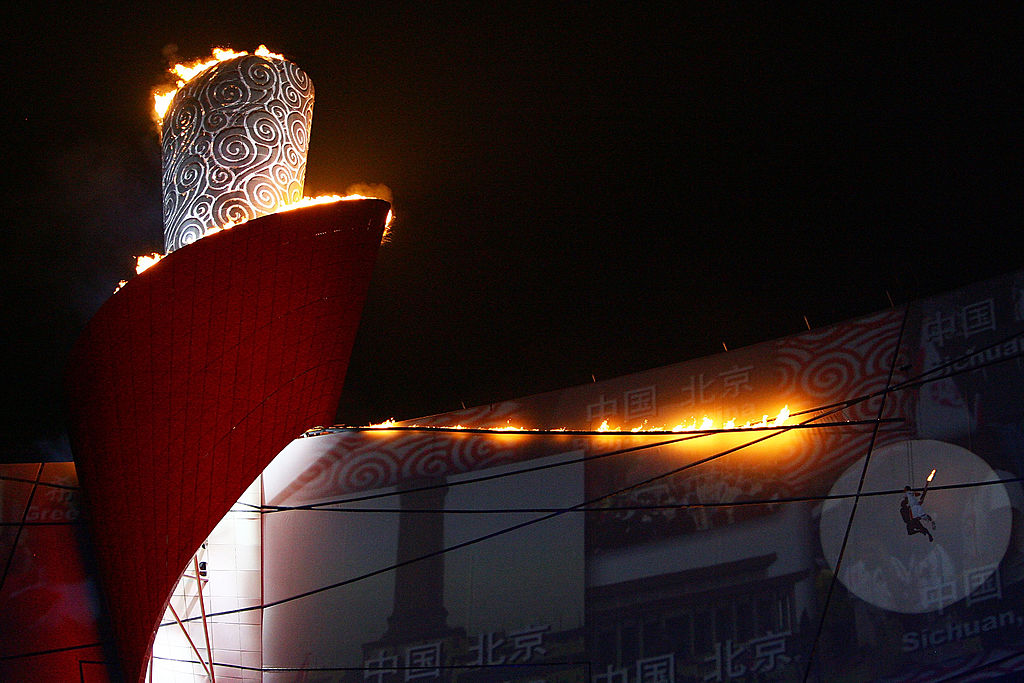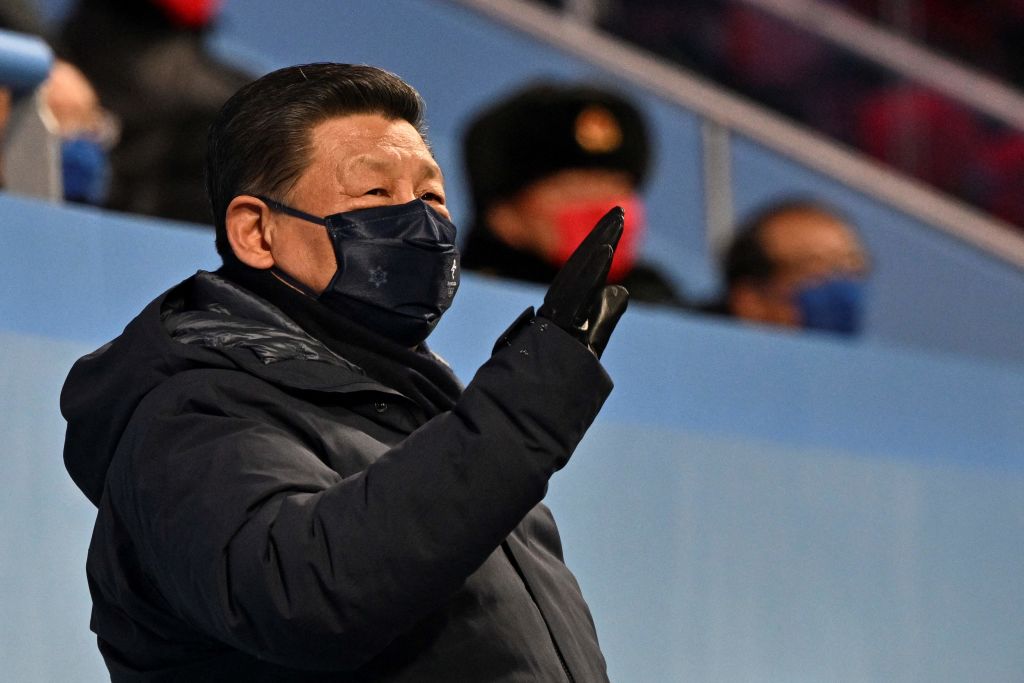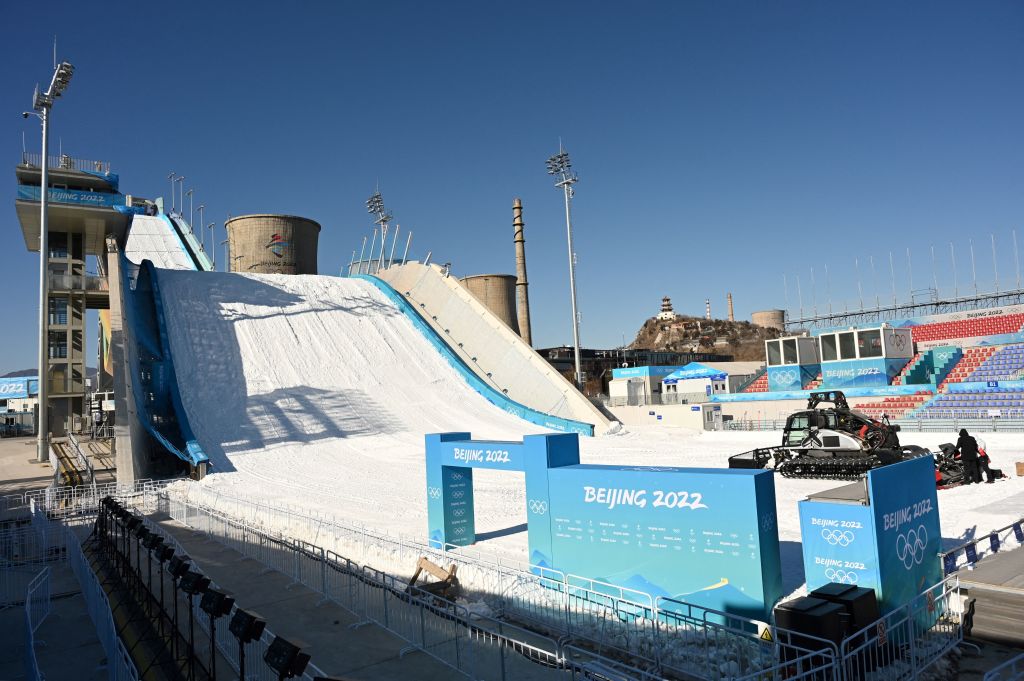The Beijing 2022 Winter Olympics opening ceremony took place on Feb. 4 in a world that has changed dramatically since the last time the Chinese capital held the Olympic Games.
The 2008 Beijing Summer Olympics marked China’s “coming out” as a global superpower. One third of the world tuned in to the $100 million event. Some 15,000 performers participated in a production that showcased the best of Chinese history and culture. An estimated 91,000 people, including U.S. President George W. Bush and other world leaders, attended the event, which Steven Spielberg had called the “grandest spectacle of the new millennium.”
In contrast, the Beijing 2022 Games is the second Olympics to take place under strict COVID-19 restrictions as the global pandemic enters its third year. Foreign fans are banned, and only 150,000 spectators will be allowed at the Games. And geopolitical tensions hang over the Beijing Winter Olympics: The U.S. and some allies announced a diplomatic boycott amid criticism of China’s human rights record, and athletes are being warned against speaking out while in the country.
But China vowed it would stage a historic opening ceremony nonetheless, including a cauldron lighting that is “unprecedented in the over 100-year history of the Olympic Games,” with performers from across the country of 1.4 billion people.
Here’s what you need to know about the 2022 Winter Olympics Opening Ceremony.
When is the 2022 Beijing Olympics Opening Ceremony?
The opening ceremony for the 2022 Winter Games is on Feb. 4. The Beijing Olympics’ formal opening began at 7:30 p.m. China Standard Time—or 6:30 a.m. ET and 3:30 a.m. PT.
How can I watch the 2022 Beijing Olympics Opening Ceremony?
Viewers in the U.S. can watch the Olympic Opening Ceremonies live on NBC, USA Network and the Olympic Channel at 6:30 a.m. ET on Feb. 4. NBC also has a primetime broadcast on the same day at 8 p.m. ET, and a re-airing at 12:38 a.m. ET on Feb. 5. Premium users of NBC’s online streaming service, Peacock, can watch the event live, while a live stream will also be available on NBCOlympics.com.
Unlike the 2008 Summer Olympics, NBC will not delay its U.S. telecast for primetime viewing.
Viewers in the U.K. can watch the Games on Eurosport and the BBC, while those in Australia and Canada can find broadcasts on their own national public broadcasters.

What happened at the Beijing Olympics Opening Ceremony?

Beijing’s organizing committee assured a “simple, safe and splendid” staging of the Winter Games during the COVID-19 pandemic, and the opening ceremony will reflect that theme.
Internationally acclaimed filmmaker Zhang Yimou, who directed the spectacular launch of the 2008 Summer Olympics, returned for the 2022 Beijing Winter Olympics opening ceremony. He promised a “different and unique” opening this time around in an interview with state-run news outlet Xinhua: “China’s status in the world, the image of the Chinese and the rise of our national status—everything is totally different now.”
With a runtime of 1 hour and 40 minutes and some 3,000 performers joining, the ceremony was scaled down from 2008’s extravaganza due to cold weather and the pandemic. It was still held at the National Stadium, dubbed the “Bird’s Nest,” and Zhang promised an “innovative” cauldron-lighting that will echo China’s thrust towards environmental protection.
Viewers were greeted by Chinese President Xi Jinping, who sat alongside International Olympic Committee President Thomas Bach in the stadium. Russian President Vladimir Putin, who hours before the opening ceremony met with Xi, was also present at the opening ceremony.
In 2008, Chinese gymnast and entrepreneur Li Ning lit the Olympic cauldron after running alongside the top rim of the National Stadium, hoisted in mid-air by wires. China has yet to announce the torchbearer for this year’s Games.
Who is attending the Winter Olympics this year?
Some 2,900 athletes from over 90 countries are attending the Winter Games in China, close to figures of participating athletes in Sochi, Russia in 2014 and Pyeongchang, South Korea in 2018.
Team USA was led into the Opening Ceremony by flag bearers John Shuster, a defending gold medalist in men’s curling and a five-time Olympian, and speed skater Brittany Bowe, a three-time Olympian who made headlines earlier this year for giving up her spot in the women’s 500-m so her teammate and friend Erin Jackson could fulfill her Olympic dreams. Team USA had originally voted bobsledder Elana Meyers Taylor to bring in the flag, but the role went to alternate Bowe after Meyers Taylor tested positive for COVID-19.
Making an Olympic comeback for the U.S. is alpine skier Mikaela Shiffrin, who won a gold medal for giant slalom and a silver in the alpine combined in 2018. In Sochi 2014, she became the youngest slalom champion in Olympic alpine skiing history at just 18 years old.
The U.S. team also sent in 2018 halfpipe gold medalist Chloe Kim—the youngest woman to win an Olympic gold medal in snowboarding—and three-time figure skating World Champion Nathan Chen, who is set to go up against Japan’s Hanyu Yuzuru, the first Asian men’s singles skater to win Olympic gold.
China’s freestyle skiing prodigy Eileen Gu will go big with her Olympic debut at 18 years old by joining three events: half-pipe, big-air and slopestyle. She will be among some 400 athletes representing the host country in the Games—a sharp increase in the number of Chinese athletes in the Winter Olympics. (In 2018, China sent 82 athletes to Pyeongchang.)
Read more: Skier Eileen Gu Navigates the Road to the Beijing Olympics
Norway, which won the most medals in the last Winter Games, will field Jarl Magnus Riiber who already won silver in 2018’s Olympic team skiing event, as well as gold medalist for the men’s 20km individual biathlon, Johannes Thingnes Bø.
Who won’t attend the Winter Olympics this year?
Several countries including the U.S., U.K., Canada, and Australia have decided against sending diplomats to the Games, as part of an Olympic boycott over China’s failure to address human rights abuses, particularly in Xinjiang. India also joined the list of countries engaging in a diplomatic boycott after China’s Olympic torch relay featured a soldier who was injured in a deadly border clash in 2020.
Boycotts aren’t new to the Olympics—with the most prominent one staged by the U.S. in 1980 Moscow Games—but the recent snubs ended a détente over the Olympics that has been there since the end of the Cold War.
Athletes will not be barred from joining the Games this time around, unlike in earlier boycotts. But they’ve been advised against expressing political opinions while competing in Beijing, a warning which did not sit well with the boycotting governments.
Read more: How the U.S. Boycott of the Beijing Olympics Is Splitting the World
COVID-19 also stopped some athletes: the U.S. National Hockey League players won’t participate in the Beijing Games following a series of postponements of regular season NHL games.
North Korea did not send athletes to the Games, albeit for a different reason. In September 2020, the International Olympic Committee suspended the isolationist state’s Olympic panel until the end of 2022 after it failed to send athletes to the Tokyo Summer Olympics—effectively barring its athletes from joining this year.
Can fans attend?
Only 150,000 spectators will be allowed to attend the Games’ events. Organizers said they have invited “international friends residing in China’s mainland, members of diplomatic missions, and marketing partners,” as well as schoolchildren and winter sports enthusiasts. Earlier, the local organizing committee earlier announced no tickets will be sold to the Chinese public—instead distributing these to certain groups, who still need to “abide by the COVID-19 countermeasures” for the event’s entirety.
Beijing copied Tokyo in prohibiting international spectators from attending the Games in-person, marking the second Olympics without overseas fans due to COVID-19.

What do we need to know about the venues?
While Beijing is the official Olympics host city, two other neighboring areas will also stage events—the mountainous suburb of Yanqing and popular ski destination Zhangjiakou, both located northwest of Beijing. These three regions are connected by a high-speed railway specifically constructed for the Games. The trains will ferry passengers the 46 miles to Yanqing, and the 111 miles to Zhangjiakou in about 1 hour. Each region will also have Olympic villages that can house more than 6,000 competing athletes and team officials.
Beijing’s National Stadium will not host any sporting events, but it was the site of the Opening Ceremony and will also host the Closing Ceremony. Previous Olympic venues in the city such as the National Aquatics Center and the National Indoor Stadium are also being reused, but China built a new dome—the Ice Ribbon—specifically for the speed skating competitions. The country also constructed the Big Air Shougang stadium for freestyle skiing and snowboard Big Air competitions in Beijing, making it the world’s first permanent venue for Big Air.
The Yanqing zone will be the venue for alpine skiing events and sliding events: bobsled, luge, and skeleton. Zhangjiakou will stage the majority of ski and snowboarding competitions, such as freestyle, cross-country, ski jumping, and biathlon.
How will China minimize COVID-19 infections during the Winter Olympics?
Western countries have criticized China’s draconian approach to suppress any domestic outbreak of COVID-19, using widespread surveillance and mass testing to track any infection, as well as rigid lockdowns and border closures in order to contain its spread. To date, China’s “zero COVID” policy has helped keep the number of coronavirus-related deaths to just 4,849 for the entire pandemic, despite the SARS-CoV-2 virus being first detected in China. (In China, the number of reported COVID-19 deaths per million people is just 3, compared to 2,638 in the U.S.)
Read more: Don’t Expect China to Ease Its Zero-COVID Policy After the Beijing Olympics
The Zero COVID policy is the cornerstone of the Beijing Olympics anti-epidemic playbook published last December. China will manage athletes and other inbound participants under a “closed-loop” system. Athletes, coaches and the media will only be allowed to visit designated Olympics venues using special transportation that is separate from Beijing’s 21.5 million people. The three zones of Beijing, Yanqing, and Zhangjiakou will have their own closed loop systems—barring those inside from having any contact with the wider Chinese population. To transfer from one closed loop system to another, they must take designated trains, or travel on assigned buses which will ply specific routes.
Non-vaccinated participants must stay for 21 days in a designated quarantine facility before they can enter the closed loop system.
Olympics participants and media must also wear masks at all times, except when competing, eating or drinking. Their health will also be monitored daily through the MY2022 app, which was specifically created for the Games. (Cybersecurity experts have flagged data security flaws in the app—prompting some Western governments to urge the use of burner phones.)
Athletes who test positive will not be allowed to compete or take part in Olympic events. Symptomatic positive participants will be sent to a hospital for treatment, and asymptomatic patients will be transferred to isolation facilities. For both cases, the patient will only be released after returning two consecutive negative COVID-19 test results. Once negative for the virus, those who wish to return to the Games must follow protocols for close contacts of confirmed cases, including taking a test six hours before competition.
Read more: What Happens When an Athlete Tests Positive for COVID-19 at the Tokyo Olympics
Chinese residents who work and volunteer for the Olympics will have to receive a COVID-19 vaccine booster shot at least two weeks before they enter the loop. They must also have the MY2022 app in their phones, and will be tested for the virus daily. They are required to stay in the closed loop throughout the event—which means they will miss traditional Lunar New Year celebrations usually spent with family.
Some 19,000 volunteers will work during the 19-day Olympic Games, according to state-run newspaper Global Times.
More Must-Reads from TIME
- Caitlin Clark Is TIME's 2024 Athlete of the Year
- Where Trump 2.0 Will Differ From 1.0
- Is Intermittent Fasting Good or Bad for You?
- The 100 Must-Read Books of 2024
- Column: If Optimism Feels Ridiculous Now, Try Hope
- The Future of Climate Action Is Trade Policy
- FX’s Say Nothing Is the Must-Watch Political Thriller of 2024
- Merle Bombardieri Is Helping People Make the Baby Decision
Contact us at letters@time.com